We spoke to the creators and writers of ±«Óãtv One's new drama Better, Sam Vincent and Jonathan Brackley. They introduce the drama's themes and characters and share some great tips on scriptwriting.
Better begins at 9pm on Monday 13th February 2023 with all episodes available on ±«Óãtv iPlayer as a day-one drop
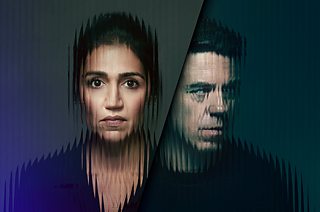
Better, starring Leila Farzad and Andrew Buchan
Sam and Jonathan, why did you want to tell this story?
Sam: Jon and I are fascinated by bad people and where they fit into society, how they are made and in the case of this story how they are potentially unmade, which I guess is what this story is about.
This is just one of those stories which has been under our skin and niggling away at the back of our brains for many years. It has changed a lot along the way, but we are just endlessly fascinated by these themes of morality. It’s not an uncommon theme to examine redemption in a screenplay, a TV series or film but we hope we have found a fresh take on it with Better.
What if redemption isn’t about a lightning-strike moment where a person turns from bad to good in a single moment but instead it’s a painful, slow battle to become good?
How does your story playout with regard to your lead characters Lou Slack and Col McHugh?
Sam: We conceived of this character (Lou Slack played by Leila Farzad) who had got herself into a situation whereby once she had decided to try and course-correct, she found that everything she did to climb out of the hole that she had dug for herself actually just led to her slipping down a few more rungs. Once we had conceived of that world that’s when the story started to bloom naturally.
From there we decided to create this counterpart character to her (Col McHugh played by Andrew Buchan) and tell a different take on the situation, showing how their two paths intersect.
Essentially Better is about ‘can a bad person become good, is that possible and if so then how do they do that?’
Better - watch the trailer
Do you begin your writing process with those big themes?
Jonathan: We’re interested in all sorts of things, but when you come to actually writing something it’s really hard to start with a ‘big idea’, a big picture or theme, because it’s hard to draw out relatability from that.
We always start with a character. We start from that ground level and spend an awful lot of time talking about that character, what sort of things they are going to do and what’s their general journey and then we build out from there.
The main protagonist of Better, Lou Slack, actually originated many years ago, with a slightly different character who wasn’t a police officer, but she evolved to really increase the moral quandary that she finds herself in.
Sam: The story goes back so many years that the first conception of it involved a man dying of cancer. The story and plot were very very different. That shows how the story naturally evolved, because it was an idea that we kicked around for years and years before we finally actually got to make it.
Why did you settle on these characters as being the ones to tell the story? What is it about them?
Sam: I think that in Lou’s case it was when we figured out how somebody could slip into corruption without even noticing. It was really key to get this back-story element of 'bit by bit by bit'. The first time she took the first step across that line, just a toe, an infinitesimal inching towards doing something bad, and then that becomes iterative. Each time she went just a little bit further so she could always justify it to herself. She’s a very articulate, persuasive, charismatic person and she can turn those powers on herself.
It felt completely plausible to us that she could slip into a place of extreme corruption over the years but still never quite realise what had happened to her and be able to justify her actions to herself. That was when we felt we had a really compelling character who could do something really, really bad but we could present the audience with someone who was also a mother, a funny friend, really good at her job.
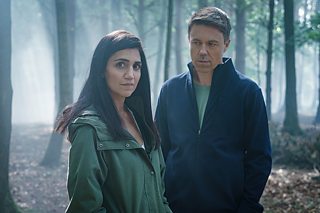
Lou (LEILA FARZAD) and Col (ANDREW BUCHAN) in Better. (image credit: ±«Óãtv/Sister Pictures/Ross Fergusan)
How do you think you make characters who do bad things sympathetic to the audience?
Jonathan: We always talk about this in terms of hearing that you need to like the characters that you’re watching. We’ve never really subscribed to that point of view. We always say you have to be interested in them and interested in their plight. At some level you have to understand why they are doing what they are doing. You don’t have to agree with it, you don’t have to like it or approve of it but you have to understand the reasons why they are doing something and think ‘OK I can understand that character and go on this journey with that character’.
Sam: It’s that thing of loving to watch , , the people in the but would you want to spend real time with any of these people? It’s a more complex situation to like and be sympathetic with fictional characters than it is in our real lives. As Jon says it’s about whether you can understand them. If you can’t understand them then you’re in big trouble.
Without giving anything away, how do you escalate the drama through the series? What have the audience got to look forward to?
Sam: Well I think the drama has a self-escalating mechanic built into it because it starts with this incident where a terrible thing happens in Lou’s family life that triggers this process of her examining her conscience. She denies it and suppresses it at first. The true antagonist of Better is Lou’s conscience and her struggles against it.
As she begins to acquiesce to its demands, she starts to say to herself “I’ll fix this bad thing that I’ve done” and then that makes something else bad happen which brings her into greater and greater conflict with Col. By the process of trying to act in the way that her conscience compels her she escalates the drama until you get to a place of very high drama by the last couple of episodes of the series, hopefully in a way which is truthful to these characters.
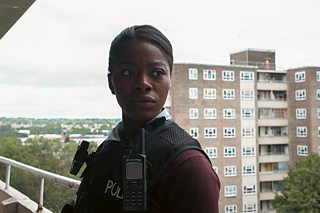
Esther (OLIVIA NAKINTU) in Better (Image Credit: ±«Óãtv/Sister Pictures/Matt Towers)
How did you first meet and start writing together?
Jonathan: We’ve known each other since we were eleven. We went to school together. We didn’t start writing together then but made videos and parodies, that kind of thing. Later on we made some short films.
Sam: We also made an hour-long snooker-themed action comedy called Maximum Break where he played the hero and I played the bad guy!
Jonathan: We went to university to study film but it wasn’t a practical course, it was an academic course, so we watched a lot of films that we would otherwise never have watched. After that we went our separate ways. I worked in TV Production, light entertainment, post-production, that kind of thing.
Were you writing at this point?
Jonathan: I went into TV Production to try and get into writing through that route.
Sam: I just tried to white-knuckle it and went for it writing spec scripts including a spec Romantic Comedy when I was working in a bookshop which then won a prize. In a fit of huge over-confidence I immediately jacked in my job and then obviously it took years and years to actually earn any money from writing!
When we were both writing separately we ended up with the same agent. We were still friends and thought we should try writing something together – a comedy script. That led to a little bit of a comedy career. Then we wrote a drama together and that really opened doors. Ultimately I think it’s all based on the fact that we had been good friends at school so there is zero ego between us and we can just say to each other “That’s no good” or “This bit is rubbish”.
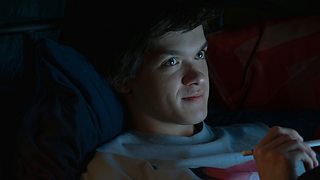
Owen (ZAK FORD-WILLIAMS) in Better (Image Credit: ±«Óãtv/Sister Pictures)
How do you actually work together? Do you sit together? Does one write a draft and then the other gives notes?
Jonathan: At the beginning it’s just lots and lots of talking to make sure we’re on the same page. We talk about the characters, about the story, about the structure. And then we’ll outline everything properly with both of us in the room. We’ll create quite a detailed outline so we’re able to split up bits of the script when we’re ready to write a first draft. One of us will start writing the first chunk and the other one will start writing something else and then we’ll swap those, edit them and then write the next bit, so it’s sort of rolling editing.
So you script-edit each other as you go?
Jonathan: Yes exactly. We have tried writing the same thing in the same room before and it just takes forever. It takes about five hours just to write one sentence! Even though it’s collaborative, we work together and it feels like everything is both of ours, when it actually comes to literally putting the words down on the page then you need a flow and I think you can only get that from one brain. You need to go off into mental flights of fancy to actually get a product down.
That’s slightly different with comedy because then you're bouncing ideas off each other and improving gags, so being in the same room is better for that.
Sam: But even then you’d probably be working from a draft written by one person.
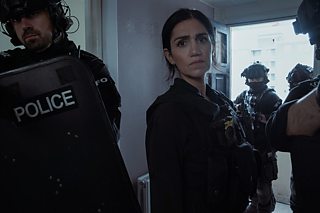
Lou (LEILA FARZAD) in Better (Image Credit: ±«Óãtv/Sister Pictures)
Any top tips for other aspiring writers?
Jonathan: Always finish what you’re writing. I think the temptation, especially for people having a go at writing for the first time, is to start something, get halfway and then think "this isn’t working, I’m going to do something else" and then you don’t ever really finish anything. You need to finish something to find out if it’s any good. And then you need to re-write it. The old chestnut that ‘writing is re-writing’. If you’re still not happy with it then by all means go and write something else but finish it first, re-write it and then decide.
Sam: When people tell us that they want to write or that they are writers our first question is always “Have you finished anything?” The answer sometimes is “No”. If they have finished something the next question is “Would you show it to someone” and then often the answer is “Oh no I could never show it to anyone”. If you can answer “Yes” to both of those questions then you’re on your way.
The internet is absolutely awash with screenplays that you can read for free so search for them. There’s a free education sitting there. And in terms of screenwriting books and courses you can absolutely learn stuff from those too but go in with a sceptical eye. You need to hold onto who you are and why you’ve chosen to try and bring stories to people. You can’t teach people how to have a good idea, you can’t teach people how to see other human beings from a unique perspective and be able to share that with others. But you can learn huge amounts of useful stuff from all of those resources, so hoover them all up while remaining true to who you are.
Can you share some of your Desert Island TV shows or Films?
Both: , , , , currently on TV then we'd say .
Watch Better on ±«Óãtv One and ±«Óãtv iPlayer from 9pm on Monday 13th February
